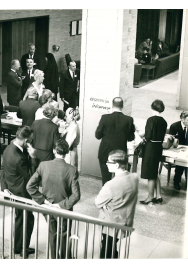Centenary of the Lithuanian Catholic Academy of Science

The Lithuanian Catholic Academy of Science (LCAS), the oldest academic organisation in Lithuania, celebrated the centenary from the establishment. In Šiauliai, Kaunas, Vilnius, Klaipėda the Church Heritage Museum together with the Academy presented the itinerant exhibition which told the history and explored the activities of this institution.
The Lithuanian Catholic Academy of Science (LCAS) was established in Kaunas on 22 October 1922. Since then, the Academy consists of members-academicians, members, assistant members, and honorary members. In 1933, 1936, and 1939, the LCAS organised the first three congresses of scholars and science lovers in Kaunas. The Academy supported the studies of promising young Catholics with scholarships and loans, and started publishing scholarly volumes. In 1940, the Academy was suppressed by the Soviet authorities and its vast library was nationalized. The end of World War II and the Iron Curtain separated members of the Academy who stayed in Lithuania from those who left for the free world.
In 1956, the LCAS resumed its activity among the émigrés. Professor Antanas Liuima, a Jesuit priest, served as the head of the Academy for 33 years. The number of members of the LCAS increased significantly, from 85 members in 1956 to 263 in 1985. Twelve branches of the Academy were established in the USA, Canada, and Germany, with most members living in the US. The LCAS congresses were of particular importance for the Lithuanian diaspora — eleven of them took place in Rome, and various other cities of the USA, Canada and Germany. During this time, the Academy considerably expanded its publishing activities.
In 1990, the Academy was re-established in Lithuania and its headquarters subsequently moved to Vilnius in 1992.
The Jesuit priest and future bishop, Dr Jonas Boruta SJ was the main driving force behind the re-establishment and development of the Academy in Lithuania. Prof. Giedrius Uždavinys was elected the first chairman of the revived LCAS. Since then, the Academy continues and develops its publishing activities, carries out research projects, organises seminars, lectures, discussions, supports and rewards students and young scholars. The LCAS has also developed a closer relationship with the international association of Catholic intellectual federations, ‘Pax Romana’.
During the interwar period, the Academy provided students with scholarships and loans. The financial support has opened doors for future scholars to study at foreign universities, mainly in Germany and France.
Lately, the Academy has renewed its relationship with the younger generation. In 2021, Studies’ Session, a weekend-long event for students, was organised for a first time. In addition, the Academy established a prize for the best master’s thesis on Christianity or Christian culture.
Since its foundation, the Academy has been open to all science and culture lovers –
it is possible to join the LCAS as an associate member. Recently, the educational mission of the LCAS has been carried out by the Minor Academy, founded in 2011. It offers the opportunity for the public to study Christianity at an academic level as its various courses are delivered by scholars and university professors. Every year
the Minor Academy attracts more than 1,000 students. During the COVID-19 pandemic, geographically wider and more numerous audiences were able to attend online courses.
Traditional gatherings of the Academy members are the congresses held since 1933. Papers delivered at the congresses have been published in twenty volumes of the “Works of the LCAS Congresses”. The most important scholarly publication of the Academy is the “LCAS Annuals”, launched in 1965. The LCAS is an important centre for studies of Church history and publication of its sources (represented by the series “Bažnyčios istorijos studijos” (“Studies in Church History”) and “Fontes historiae Lituaniae” respectively). The LCAS is also actively engaged in editing biographies, memoirs, and the oevres of its members-academicians.
Organisers: Church Heritage Museum, Lithuanian Catholic Academy of Science
Exhibition curators: Kamilė Jagėlienė, Liudas Jovaiša
Architect: Ieva Cicėnaitė
Designer: Laura Varžgalytė
Photos: Lithuanian Catholic Academy of Science, Lithuanian Central State Archives, Central European Jesuit Province Archives in Vilnius, Archives of the Kaunas Archdiocesan Curia, Vilnius University Library, Kretinga Museum, Samogitian Art Museum, Samogitian Museum “Alka”, Maironis Lithuanian Literature Museum, Collection of „Naujasis Židinys-Aidai“, Antanas Rubšys Collection, Goda Kotryna Jokubauskienė Collection
Sound recordings: Lithuanian Central State Archives






